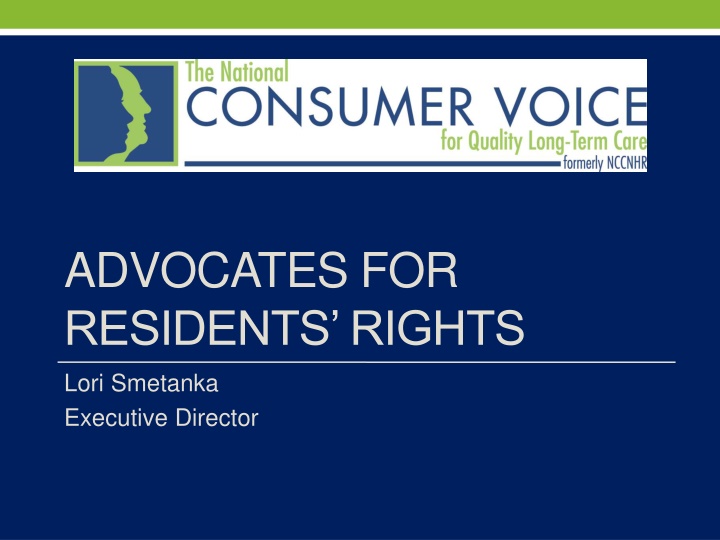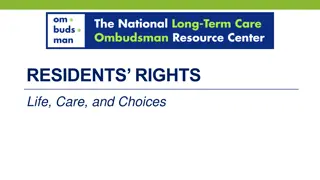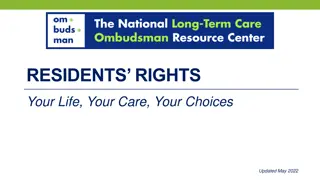Advocates for Residents' Rights - Consumer Voice Mission and Vision
Advocates for Residents' Rights, led by Lori Smetanka, is an organization advocating for quality long-term care services and supports. They focus on public policy, empowerment, education, and promoting the role of direct-care workers. Their vision is to ensure consumers are treated with respect and have affordable, quality care options. Consumer Voice's mission includes advocating for quality care policies, empowering consumers, and supporting long-term care advocacy groups. They also have a public policy agenda to support consumers' needs and rights in long-term care settings.
Download Presentation

Please find below an Image/Link to download the presentation.
The content on the website is provided AS IS for your information and personal use only. It may not be sold, licensed, or shared on other websites without obtaining consent from the author.If you encounter any issues during the download, it is possible that the publisher has removed the file from their server.
You are allowed to download the files provided on this website for personal or commercial use, subject to the condition that they are used lawfully. All files are the property of their respective owners.
The content on the website is provided AS IS for your information and personal use only. It may not be sold, licensed, or shared on other websites without obtaining consent from the author.
E N D
Presentation Transcript
ADVOCATES FOR RESIDENTS RIGHTS Lori Smetanka Executive Director
Founded in 1975 as the National Citizens Coalition for Nursing Home Reform (NCCNHR) because of public concern about substandard care in nursing homes. In 2010 expanded focus to advocate for people who need long-term services and supports in any setting, including assisted living and home and community based settings (HCBS).
Our Vision The Consumer Voice envisions a world in which all consumers of long-term care, services and supports are treated with respect and dignity and have a wide range of affordable, quality options across all care settings. These options will make it possible for individuals to receive care and services in the location and manner of their choice and to attain a high quality of life.
Consumer Voices Mission: To represent consumers at the national level for quality long-term care, services, and supports To carry out our mission, we: Advocate for public policies that support quality care and quality of life responsive to consumers needs in all long- term care settings; Empower and educate consumers and families with the knowledge and tools they need to advocate for themselves; Train and support individuals and groups that empower and advocate for consumers of long-term care; Promote the critical role of direct-care workers and best practices in quality care delivery
Consumer Voice Public Policy Agenda Advocate for public policies that support quality care and quality of life responsive to long-term care consumers needs. To develop, fund, strengthen and preserve programs, laws, and regulations that provide services for and protect long-term care consumers. To ensure a strong and independent long-term care ombudsman program. To advocate for the establishment and enforcement of long-term care consumers rights.
Consumer Voice Public Policy Priority Areas Nursing Home Staffing Reporting of staffing levels through payroll data 24hr RN legislation 4.1 hours of direct care per resident per day Preserve and strengthen the Nursing Home Reform Law of OBRA 87 and Requirements of Participation Assisted Living Implementation of the new HCBS rules Improve contract protections for consumers Establish protections against Medicaid discrimination Advocate for consumer disclosure statements
THE LONG-TERM CARE OMBUDSMAN PROGRAM (LTCOP) Overview of the History, Role, and Responsibilities
What is a Long-Term Care Ombudsman? A Long-Term Care Ombudsman (LTCO) is a resident advocate. LTCO advocate for quality of care and quality of life of residents in long-term care (nursing homes, board and care/assisted living, other similar adult care facilities). LTCO provisions in the Older Americans Act (OAA) include: Investigate and resolve complaints Provide information to residents, families, staff (e.g. residents rights) Advocate for systemic changes to improve residents care and quality of life.
History of the Long-Term Care Ombudsman Program (LTCOP) Five Nursing Home Ombudsman Demonstration programs established to focus on nursing home resident complaint resolution 1972 Older Americans Act (OAA) amendments requiredall states to establish an Ombudsman Program Program designed to be a local, community program utilizing volunteers 1978 Duties expanded to board and care homes (e.g. Assisted Living Facilities) Name changed from Nursing Home Ombudsman to Long-Term Care Ombudsman (LTCO) 1981 LTCO access to resident records (with resident consent) States must prohibit willful interference of official LTCO duties and/or retaliation against a LTCO, resident or other individual related to LTCOP duties 1987
LTCOP Responsibilities Identify, investigate and resolve complaints made by or on behalf of residents. Advocate for changes to improve residents quality of life and care. Represent resident interests before governmental agencies. Provide information to residents about long-term care services. Seek legal, administrative, and other remedies to protect residents. Provide technical support for the development of resident and family councils. Ensure residents have regular and timely access to the LTCOP.
LTCO seek to resolve complaints to the residents satisfaction LTCO represent residents interests The resident guides LTCO action LTCO are Resident Advocates LTCO need resident consent before sharing information LTCO empower residents and promote self- advocacy
Role of the LTCOP: Long-Term Care Ombudsmen LTCO are knowledgeable of federal and state regulations and will refer to relevant regulations as they advocate for the highest quality of care and life for residents. Do not conduct licensing and regulatory inspections or investigations If necessary, with resident consent, LTCO will file a complaint with licensing and regulatory. Are not Adult Protective Services (APS) investigators LTCO provide information regarding preventing and reporting abuse, neglect, and exploitation. LTCOPs do not have the same standard of evidence requirement as APS and are not the official finder of fact. LTCOPs attempt to resolve complaints to the residents satisfaction (including those regarding abuse), not gather evidence to substantiate that abuse occurred. If necessary, with resident consent or permission of the State LTCO if the resident can t consent and does not have a legal representative, the LTCO will file a complaint about alleged abuse. LTCO share information about quality care practices and ways to enhance the quality of life for residents. Do not provide direct care for residents LTCO are a resource for staff training and provide information for community resources.
State LTCO Programs Who are LTCO? 53 State Long-Term Care Ombudsmen (each state and Guam, Puerto Rico and Washington D.C.) Local Long-Term Care Ombudsmen (559 local programs) Volunteer Ombudsmen (8,155 certified volunteers in 2014) Volunteer Ombudsmen Not all state and local programs have volunteer LTCO Volunteer LTCO duties vary depending on the state program Volunteer LTCO may: Investigate complaints, provide in-service training, visit residents, and support resident and family councils.
State LTCO Programs LTCO visit residents in: Nursing homes and assisted living facilities/board and care homes. In a small number of states, LTCOPs also visit individuals that receive long-term care services in their own home. Do LTCO represent all residents, regardless of age? OAA programs provide services to individuals 60 and older, but the LTCOP will assist residents younger than 60 as advocacy for individuals younger than 60 will also benefit other residents. How often do LTCO visit? LTCO regularly visit facilities in order to provide access to the program, but how often depends on the program (e.g. weekly, monthly, quarterly).
LTCO Complaint Investigation LTCO investigate individual complaints and address concerns that impact several or all residents in a facility. LTCO can address general concerns they personally observe during a visit (e.g. odors, environmental issues). During complaint investigations LTCO cannot share information without resident consent. Some residents ask to remain anonymous. Investigate to gather the facts, but the main goal is to resolve the issue to the residents satisfaction. LTCO call upon others to fulfill their responsibilities to residents.
LTCO Complaint Investigation If the complaint is from someone other than the resident, the LTCO will visit the resident in order to understand the resident s capacity to make decisions. If the resident cannot provide consent, the LTCO will work with the resident s legal representative or follow their state procedure if the resident doesn t have a legal representative. Federal law grants LTCO access to resident information (with resident permission) and LTCO are required to keep that information confidential. In accordance with federal law, facilities must provide the LTCOP with immediate access to residents.
Type of Complaints LTCO handle a variety of complaints about quality of life and care. Not all complaints are about the care provided by a facility, some complaints are about outside agencies, services or individuals (e.g. Medicaid or Medicare benefits). LTCO can receive and respond to complaints from individuals other than the resident (e.g. family member), but LTCO still need resident permission to investigate or share information. Nationwide, in 2014 the LTCOP investigated 191,533 complaints in nursing homes and board and care facilities.
How to Contact the LTCOP Nursing homes are required to post contact information for the LTCOP and some states require assisted living facilities/board and care facilities to post information about the LTCOP. Visit the National Long-Term Care Ombudsman Resource Center website to locate your local or state LTCO: http://www.ltcombudsman.org/
Residents Rights Month Each October Materials, Activities, Products The Resident s Voice challenge
2016 Residents Rights Month stay tuned!
Lori Smetanka lsmetanka@theconsumervoice.org www.theconsumervoice.org www.ltcombudsman.org























